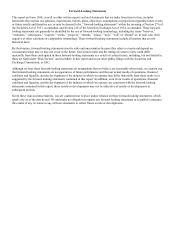Dunkin' Donuts 2013 Annual Report Download - page 20
Download and view the complete annual report
Please find page 20 of the 2013 Dunkin' Donuts annual report below. You can navigate through the pages in the report by either clicking on the pages listed below, or by using the keyword search tool below to find specific information within the annual report.-10-
reputation could be harmed, which in turn could materially and adversely affect our business and operating results.
Although we believe we generally enjoy a positive working relationship with the vast majority of our franchisees, active and/or
potential disputes with franchisees could damage our brand reputation and/or our relationships with the broader franchisee
group.
Sub-franchisees could take actions that could harm our business and that of our master franchisees.
In certain of our international markets, we enter into agreements with master franchisees that permit the master franchisee to
develop and operate restaurants in defined geographic areas. As permitted by our master franchisee agreements, certain master
franchisees elect to sub-franchise rights to develop and operate restaurants in the geographic area covered by the master
franchisee agreement. Our master franchisee agreements contractually obligate our master franchisees to operate their
restaurants in accordance with specified operations, safety, and health standards and also require that any sub-franchise
agreement contain similar requirements. However, we are not party to the agreements with the sub-franchisees and, as a result,
are dependent upon our master franchisees to enforce these standards with respect to sub-franchised restaurants. As a result, the
ultimate success and quality of any sub-franchised restaurant rests with the master franchisee. If sub-franchisees do not
successfully operate their restaurants in a manner consistent with required standards, franchise fees and royalty income paid to
the applicable master franchisee and, ultimately, to us could be adversely affected and our brand image and reputation may be
harmed, which could materially and adversely affect our business and operating results.
Our success depends substantially on the value of our brands.
Our success is dependent in large part upon our ability to maintain and enhance the value of our brands, our customers'
connection to our brands and a positive relationship with our franchisees. Brand value can be severely damaged even by
isolated incidents, particularly if the incidents receive considerable negative publicity or result in litigation. Some of these
incidents may relate to the way we manage our relationship with our franchisees, our growth strategies, our development efforts
in domestic and foreign markets, or the ordinary course of our, or our franchisees', business. Other incidents may arise from
events that are or may be beyond our ability to control and may damage our brands, such as actions taken (or not taken) by one
or more franchisees or their employees relating to health, safety, welfare, or otherwise; litigation and claims; security breaches
or other fraudulent activities associated with our electronic payment systems; and illegal activity targeted at us or others.
Consumer demand for our products and our brands' value could diminish significantly if any such incidents or other matters
erode consumer confidence in us or our products, which would likely result in lower sales and, ultimately, lower royalty
income, which in turn could materially and adversely affect our business and operating results.
The quick service restaurant segment is highly competitive, and competition could lower our revenues.
The QSR segment of the restaurant industry is intensely competitive. The beverage and food products sold by our franchisees
compete directly against products sold at other QSRs, local and regional beverage and food operations, specialty beverage and
food retailers, supermarkets, and wholesale suppliers, many bearing recognized brand names and having significant customer
loyalty. In addition to the prevailing baseline level of competition, major market players in noncompeting industries may
choose to enter the restaurant industry. Key competitive factors include the number and location of restaurants, quality and
speed of service, attractiveness of facilities, effectiveness of advertising, marketing, and operational programs, price,
demographic patterns and trends, consumer preferences and spending patterns, menu diversification, health or dietary
preferences and perceptions, and new product development. Some of our competitors have substantially greater financial and
other resources than us, which may provide them with a competitive advantage. In addition, we compete within the restaurant
industry and the QSR segment not only for customers but also for qualified franchisees. We cannot guarantee the retention of
any, including the top-performing, franchisees in the future, or that we will maintain the ability to attract, retain, and motivate
sufficient numbers of franchisees of the same caliber, which could materially and adversely affect our business and operating
results. If we are unable to maintain our competitive position, we could experience lower demand for products, downward
pressure on prices, the loss of market share, and the inability to attract, or loss of, qualified franchisees, which could result in
lower franchise fees and royalty income, and materially and adversely affect our business and operating results.
If we or our franchisees or licensees are unable to protect our customers' credit card data and other personal information,
we or our franchisees could be exposed to data loss, litigation, and liability, and our reputation could be significantly
harmed.
Privacy protection is increasingly demanding and the use of electronic payment methods and collection of other personal
information exposes us and our franchisees to increased risk of privacy and/or security breaches as well as other risks. In
connection with credit card transactions in-store and online, we and our franchisees collect and transmit confidential credit card
information by way of secure private retail networks. Additionally, we collect and store personal information from individuals,
























